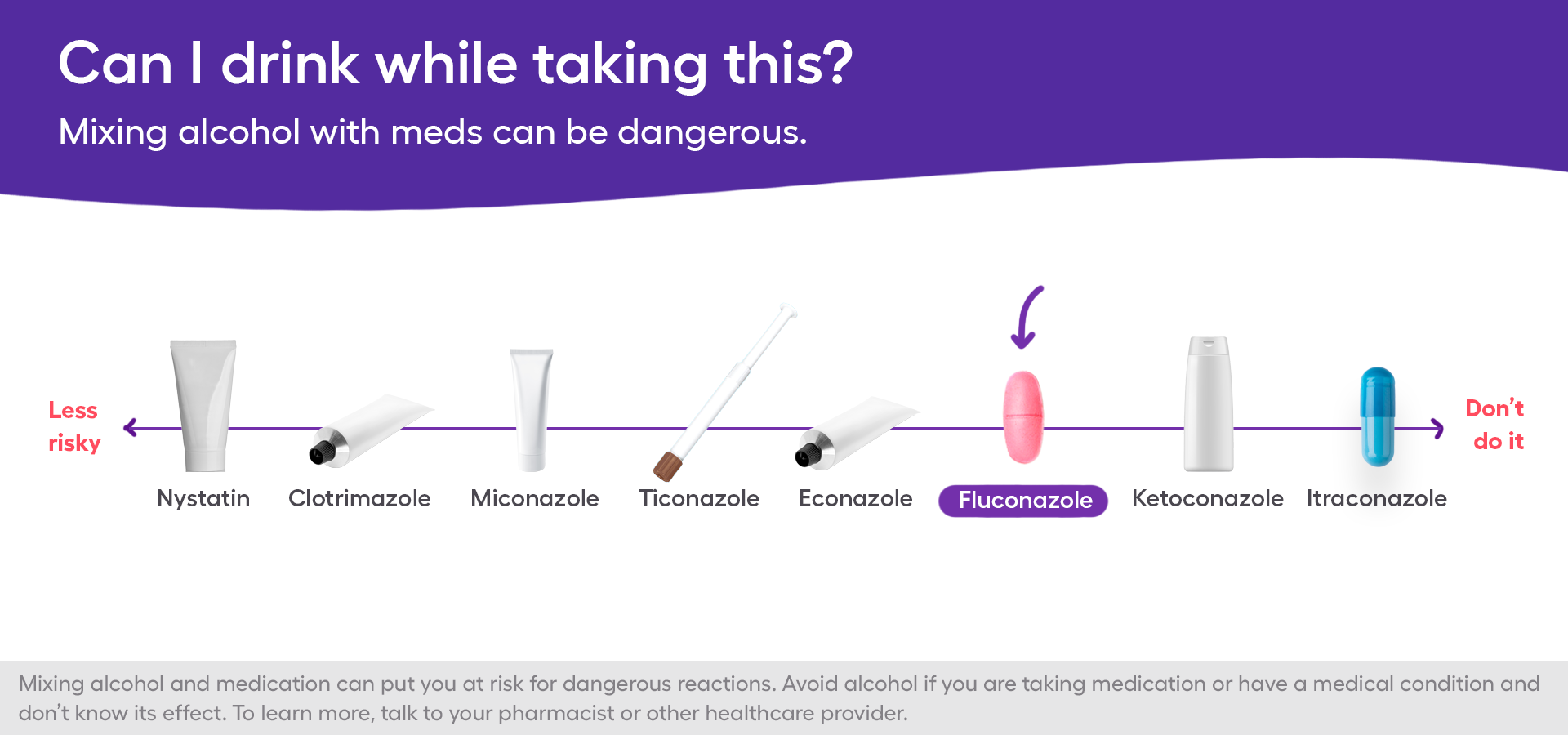Key takeaways
Fluconazole and alcohol don’t interact, but combining the two can worsen side effects and strain your liver.
On top of that, drinking alcohol may weaken your immune system, potentially slowing recovery from a fungal infection.
Always consult your provider before drinking while taking fluconazole, especially if you have liver problems.
- Can you drink while taking fluconazole?
- What happens if you mix fluconazole and alcohol?
- The effects of alcohol and fluconazole on the liver
- Are certain people at greater risk of side effects?
- How long after taking fluconazole can you drink alcohol?
- Which antifungals are not affected by alcohol?
- The bottom line
- Can you drink while taking fluconazole?
- What happens if you mix fluconazole and alcohol?
- The effects of alcohol and fluconazole on the liver
- Are certain people at greater risk of side effects?
- How long after taking fluconazole can you drink alcohol?
- Which antifungals are not affected by alcohol?
- The bottom line
You open the medicine cabinet to take a dose of fluconazole prescribed to tackle a stubborn yeast infection. Later, as you meet friends for dinner, you wonder whether it’s safe to enjoy a glass of wine. Fluconazole, also sold under the brand name Diflucan, is a commonly used antifungal medication, but generally, it’s not recommended to drink while taking it. While there is no alcohol-drug interaction, having a cocktail or two may amplify side effects like headache, nausea, and dizziness. In some cases, drinking in moderation might be safe, but it’s best to seek your provider’s guidance before doing so.
Save up to 80% on Fluconazole with SingleCare
Different pharmacies offer different prices for the same medication. SingleCare helps find the best price for you.
Can you drink while taking fluconazole?
It’s safe to drink alcohol while taking fluconazole—it doesn’t reduce the effectiveness of the medication or have a drug-alcohol interaction. However, it may weaken the body’s immune response and possibly worsen the side effects of fluconazole. Therefore, combining the two might slow recovery from a fungal infection due to alcohol’s effects on overall health.
Fluconazole treats Candida infections, including vaginal yeast infections. In addition to vaginal candidiasis, it is approved by the FDA for treating infections in the mouth or throat, such as oral thrush. It also treats systemic infections like cryptococcal meningitis in people with weakened immune systems.
The medication works by targeting the fungi’s cell membrane. More specifically, it blocks an enzyme necessary for producing ergosterol, a key part of the fungal cell membrane. By blocking this enzyme, the drug weakens the membrane, causing the contents of the fungal cell to leak out, which kills the fungus.
It’s recommended to avoid alcohol consumption when on fluconazole. However, some healthcare providers might allow drinking in moderation, depending on your overall medical condition. Moderation means no more than one drink per day for women and two for men.
Everyone’s situation is unique, so it’s important to consult a healthcare professional before deciding on alcohol use while undergoing treatment. A medical provider can offer advice based on your medical history.

What happens if you mix fluconazole and alcohol?
Mixing fluconazole and alcohol may lead to uncomfortable side effects, though there is no direct interaction between the two. Both substances have overlapping adverse effects that may worsen your ability to recover from a fungal infection.
Headache
If you’re at a social event and have taken fluconazole, mixing it with alcohol may lead to more severe headaches. After a drink or two, you might start feeling that familiar throbbing in your temples, making it hard to enjoy conversations or the atmosphere. This headache could leave you feeling irritable and exhausted, overshadowing what should be a fun time with friends.
Nausea
Feeling nauseous at a gathering can dampen your mood. If you’ve been drinking while on fluconazole, you may suddenly find yourself dealing with that uneasy feeling in your stomach. This can make it hard to enjoy the food or drinks around you and might even lead you to step away from the group to find some relief.
Dizziness
Dizziness can hit unexpectedly, especially if you’re drinking alcoholic beverages while on fluconazole. You might find yourself feeling lightheaded or unsteady, which can be particularly awkward in a social setting. This sensation can make it difficult to navigate through the crowd or join in on activities.
Upset stomach
An upset stomach may spoil the fun at any social occasion. If you’re mixing fluconazole with alcohol, you may experience bloating or discomfort that makes it hard to relax and enjoy yourself. You might find yourself avoiding certain foods or drinks that could make things worse. The stomach pain or discomfort can linger, making it tough to partake in various activities.
Alcohol can worsen the most common side effects of fluconazole. If you’re prone to these effects while drinking alcohol, you may want to avoid mixing fluconazole and alcohol altogether.
Weakened immune response
Alcohol can severely affect the immune system, which is your body’s defense against infections and diseases, and make it harder to bounce back from a fungal infection. Chronic alcohol consumption may weaken the immune response, making it more difficult for the body to fight off illnesses. This means that heavy drinkers may become sick more often or take longer to recover from diseases than those who drink in moderation or not at all.
In addition, alcohol may interfere with the function of white blood cells, which play a role in fighting infections. Drinking heavily may lower the number of these cells in the body. As a result, the immune system might not be as strong and could struggle to protect the body from germs and infections.
The effects of alcohol and fluconazole on the liver
Both alcohol and fluconazole can have serious effects on the liver. Excessive alcohol consumption may lead to various forms of liver disease, such as fatty liver disease, hepatitis, and cirrhosis. Over time, heavy drinking can lead to long-lasting liver damage if left unmanaged. People with liver problems might notice symptoms like dark urine, yellowing of the skin and eyes (known as jaundice), and abdominal pain.
Fluconazole can also affect the liver. While many people taking fluconazole experience only mild changes in liver function, some may develop more serious issues. These problems usually appear within the first few weeks of starting the medication. In rare cases, fluconazole may cause serious liver damage, sometimes leading to symptoms of allergic reactions, such as fever or rash. Most people recover after stopping the medication, but it can take several weeks or even months for the liver to heal completely.
There may be an increased risk of liver problems when mixing fluconazole and alcohol. If you have a history of liver disease or drink heavily, you may want to consult a healthcare provider before taking fluconazole.
Are certain people at greater risk of side effects?
Some people may face higher risks of side effects when taking fluconazole, such as those with existing medical conditions. People with liver or kidney problems may experience amplified effects because their bodies process the drug differently.
Individuals who may need to use caution while taking fluconazole may include those with the following:
- Liver problems
- Kidney problems
- Heart problems
- Low potassium levels (hypokalemia)
- Pregnancy or breastfeeding
When considering mixing alcohol and fluconazole, individuals who have a history of alcohol abuse may need to use extra caution. Those struggling with alcohol addiction may need to be aware that mixing alcohol with certain medications may lead to serious adverse effects. Alcohol addiction treatment programs may provide helpful support and intervention.
In addition, people who take multiple medications may be at an increased risk of side effects while drinking alcohol and taking fluconazole. Consult a medical professional about other medications you take, including prescription drugs, over-the-counter medicines, and herbal supplements, before taking fluconazole.
How long after taking fluconazole can you drink alcohol?
If you’ve just taken your last dose of fluconazole, you should wait until the medication is cleared from your body before drinking alcohol. Fluconazole stays in your body for a while. It has a half-life of around 30 hours. This means that every 30 hours, the amount of fluconazole in your system reduces by half.
For example, if you took 100 mg of fluconazole, after 30 hours, you’d have about 50 mg left. After another 30 hours, it would drop to about 25 mg, and so on. In general, it takes about five to six half-lives for a drug to clear from the body. For fluconazole, it could take approximately six to eight days for the drug to be eliminated. Since it can take several days for the drug to be fully cleared, waiting to drink alcohol until it’s out of your system may help avoid any potential side effects.
It’s also important to consider other factors, such as overall health and liver condition, as these can influence drug metabolism. For example, those with liver problems may have trouble processing fluconazole. As a result, they may experience higher levels of fluconazole in the blood and for a longer period.
Which antifungals are not affected by alcohol?
Fluconazole is an antifungal that does not have a direct interaction with alcohol. While combining it with alcohol is not recommended due to possible worsened side effects, there is no direct interaction between the two. Therefore, fluconazole may be a potential choice for those who consume alcohol occasionally, though moderation is key. Still, combining the two may increase the risk of serious adverse problems like liver damage.
Other antifungals may have minimal direct interactions with alcohol. However, several antifungals, including Mycamine (micafungin), Sporanox (itraconazole), and Vfend (voriconazole), are heavily processed in the liver and may carry a potential risk of liver damage. Therefore, drinking alcohol with antifungals may increase the risk of liver problems.
It’s important to discuss potential drug interactions when taking antifungals. Talk to your healthcare provider if drinking alcohol while taking an antifungal medication is a concern. They can determine the most appropriate treatment plan for you.
The bottom line
When taking fluconazole, it’s best to avoid drinking alcohol due to potential side effects. While fluconazole doesn’t directly interact with alcohol, combining the two can worsen side effects like headaches, nausea, dizziness, and upset stomach.
A healthcare provider may allow you to drink in moderation while taking fluconazole. However, both fluconazole and alcohol can strain the liver, which might increase the risk of liver damage, especially in those with preexisting liver conditions. Consult your doctor for medical advice before mixing alcohol and fluconazole.
- Diflucan highlights of prescribing information, U.S. Food and Drug Administration (2024)
- Drinking levels and patterns defined, National Institute on Alcohol Abuse and Alcoholism (2024)
- Alcohol related liver disease, University of Michigan Health (2023)
- Fluconazole, LiverTox (2017)
- Understanding alcohol use disorder, National Institute on Alcohol Abuse and Alcoholism (2024)
- Pharmacokinetics and tissue penetration of fluconazole in humans, Reviews of Infectious Diseases (1990)
- Antifungal drugs and drug-induced liver injury: A real-world study leveraging the FDA adverse event reporting system database, Frontiers in Pharmacology (2022)
- Impact of alcohol on inflammation, immunity, infections, and extracellular vesicles in pathogenesis, Cureus (2024)
- Blood cell responses following heavy alcohol consumption coincide with changes in acute phase reactants of inflammation, indices of hemolysis and immune responses to ethanol metabolites, International Journal of Molecular Sciences (2022)






